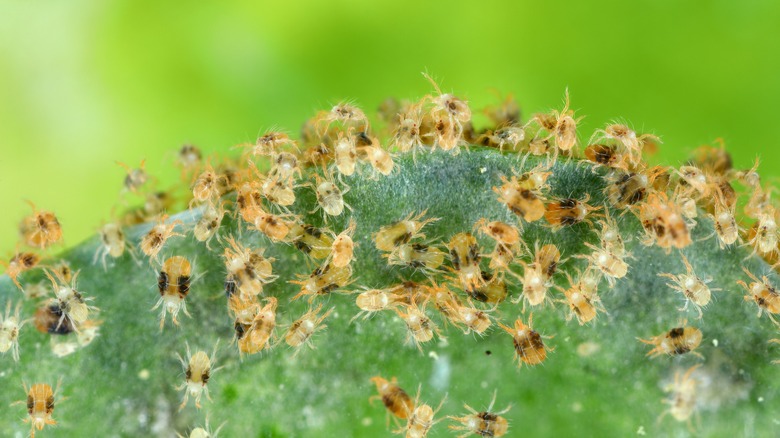How To Keep Pesky Spider Mites Off Your Mums This Year
We may receive a commission on purchases made from links.
Mums, or chrysanthemums, to be specific, are popular flowers often associated with the arrival of autumn. They come in a variety of vibrant colors — white, yellow, orange, lavender, purple, and red — that complement the fall foliage, making them a popular choice for gardens and holiday decor. As much as gardeners favor hardy mums for their beauty, resilience, and long bloom period, spider mites gravitate to them, too, as a source of food and a place to thrive and multiply.
Spider mites typically feed on the undersides of leaves, extracting sap and leaving behind a stippled, dusty appearance characterized by small dots. These pests are difficult to see without a magnifying lens, and due to this, they are often overlooked until the infestation has grown more severe, which may result in a buildup of webbing. If not properly treated, the insects will cause problems for your mums, including stunted growth or even plant death.
There are several things you can do to prevent this pest from infesting your fall flowers. Preventatively, you should inspect the leaves for stippling, discoloration, and webbing before purchase, and make sure you select healthy-looking plants. If you buy the flowers as cuttings, dip them in an insecticide like M-Pede before planting.
How to treat an ongoing infestation
Even if you only suspect spider mites on your mums, starting treatment sooner rather than later is best, as infestations can often be more severe than they appear. Begin by isolating your infected plants from other plants to stop the mites from spreading, and prune the infected area if possible. Use a strong stream of water to dislodge as many mites as possible. You can either place the planter in a sink or use a hose to thoroughly spray the undersides of the leaves.
There are many options you can use to treat your mums at this point, depending on how bad the mites are. Consider using horticultural oils, like neem oil or a natural homemade pesticide spray, which are gentler on plants. You can also wipe the leaves with a mixture of one part rubbing alcohol and three parts water. For more severe infestations, harsher insecticides such as Syngenta Avid 0.15 EC Miticide Insecticide and Pylon TR Total Release Insecticide are highly effective against spider mites. However, you must study the safety protocols — wearing goggles, gloves, and other PPE while using — and follow package instructions to avoid harm.
Most treatment methods do not kill spider mite eggs, so it's essential to repeat applications as needed to ensure they are completely eradicated. To help your mums recover from the infestation, ensure they receive adequate sunlight, maintain optimal soil moisture levels, and consider applying a natural fertilizer to promote healthy growth.

